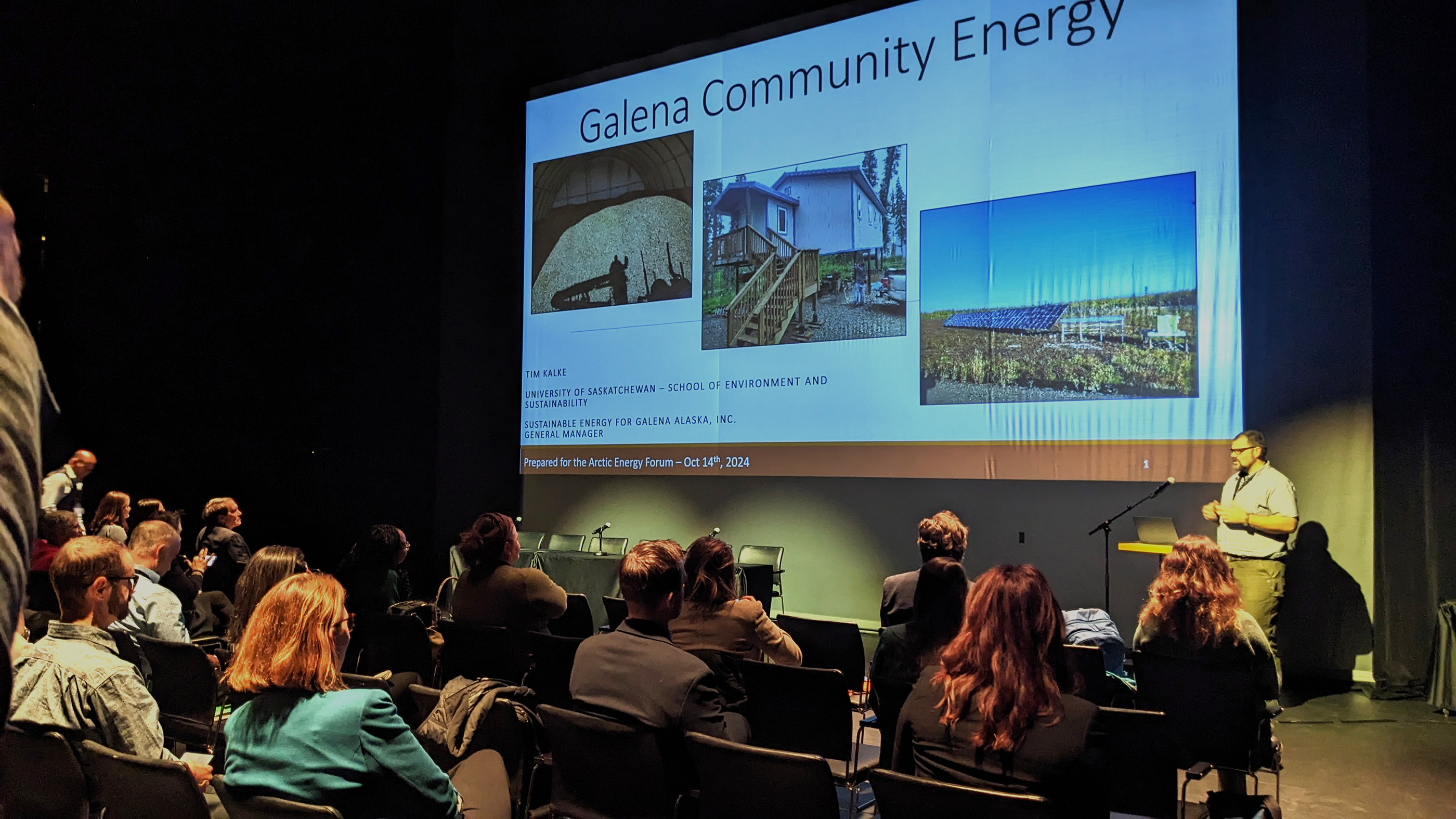Sharing knowledge for energy transitions across the Arctic
November 15, 2024

Sustainable Energy for Galena Alaska’s Tim Kalke presents on energy transitions in Galena to a packed audience at the Arctic Energy Forum.
Arctic energy experts gathered in Akureyri, Iceland, in mid-October for the Arctic Energy Forum. Attendees shared best practices and lessons learned from across the U.S. Arctic, Canadian North, Greenland and Denmark, High North of Sweden, Norway and Finland, with a special focus on energy lessons learned by Icelandic energy champions.
“Arctic energy leaders need to be able to share and learn from each other, and this was two days to do that and only that,” said ACEP Director Jeremy Kasper. “While there are other Arctic meetings, none are energy specific. These types of in-depth exchanges and opportunities for capacity building are key to ensuring successful energy transitions and creating greater energy security in the region.”
The first gathering of its kind since 2017, the forum highlighted clean energy transitions for the Arctic. Participants emphasized needs for quality energy data, climate change impacts on energy transitions, strategies for strengthening cooperation across Arctic nations, energy futures and technological innovation, carbon capture and sequestration, hydrogen strategies as well as other relevant topics, all while addressing the balance between sustainable development and energy security.
Holding the forum in Iceland had a special value. The country has recently been at the forefront of Arctic nations, providing a model for successful energy transition and contributing to a more sustainable world. It is currently embarking on its third energy transition, further solidifying its leadership in the field.
“The revival of in-depth Arctic energy discussions, alongside the Arctic Circle Assembly in Reykjavik, underscores the symbolic and practical importance of collaboration,” said Erlingur Gudleifsson, a Reykjavik -based researcher with ACEP. “As one of the leading entities in Arctic energy research, ACEP recognizes the value of such conversations in shaping the future of energy in the Arctic, fostering innovation and addressing the unique challenges of the Arctic region.”
The forum’s contributors discussed models for training Arctic energy leaders, developing resilient infrastructure, and exploring partnerships between regions like Iceland and Alaska. The forum highlighted innovation, community engagement and strategic policy to promote responsible energy transitions across the Arctic.
“While investment in clean, abundant energy is impressive, Iceland is now dealing with its own urban/rural divide in renewable energy investment,” said James Stevens, a Tribal administrator with the Native Village of Atka, Alaska. “This provides a learning opportunity for both Iceland and Alaska to develop solutions for sustainable microgrids in remote communities.”
Speakers included U.S. Ambassador to Iceland Carrin F. Patman, Greenland Minister of Energy Kalistad Lund, Alaska State Senator Catherine Giessel, Director of Iceland's Energy Authority Halla Hrund Logadottir, U.S. Head of Delegation to the Arctic Council Sustainable Development Working Group Anna Arambulo Martz, U.S. Arctic Research Commissioner Mark Meyers, the U.S. Department of Energy’s Arctic Energy Office Director Erin Whitney and ACEP Director Jeremy Kasper.
Icelandic energy leaders delivered a keynote at the conference. However, Iceland’s coalition government collapsed during the forum, which only intensified conversations from panelists about energy resiliency and policy.
The forum was bookended by energy policy tours for visitors to learn firsthand about Iceland’s industry, policy, tourism and energy systems and the role each have played in Iceland’s energy choices. Representatives of funding agencies, Alaskan energy leadership and utilities, tribal entities and national labs were also in attendance.
The forum was hosted by the Arctic Energy Foundation, a nonprofit organization in Iceland, in collaboration with Arctic Portal and ACEP, and supported by leading Icelandic, U.S. and other international partners including the Office of Naval Research’s Alaska Regional Collaboration for Technology Innovation and Commercialization program.
Discussions are already underway on when and where the next forum will take place.


